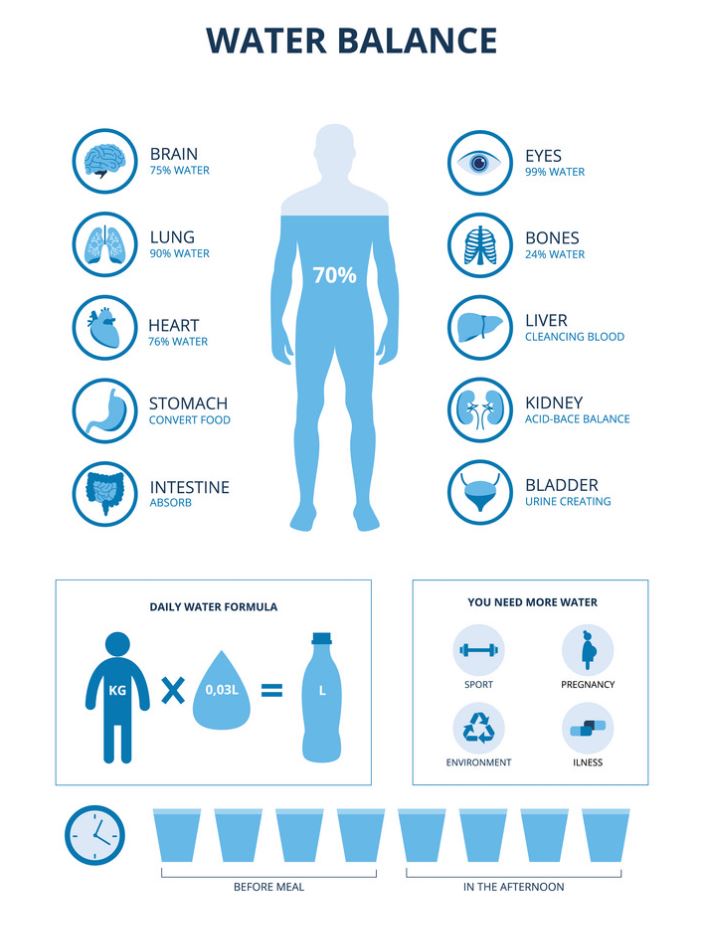

Water’s Role in Brain Health:
The importance of water for brain health is multifaceted, influencing various aspects of neurophysiology:
- Nutrient Transport and Toxin Removal: The brain’s vitality is contingent on a consistent supply of nutrients and the removal of toxins. Water is not only the carrier of these vital substances but also the medium through which cellular waste is expelled. This detoxification is critical to maintaining cognitive function and preventing neurodegenerative diseases.
- Maintaining Brain Volume and Electrical Energy: Dehydration’s impact on the brain is more profound than commonly understood. It can cause cellular shrinkage and impact the brain’s ability to function efficiently. Sufficient water intake is crucial for sustaining the brain’s volume, facilitating the proper flow of electrical energy, and supporting the overall health of neurons.
- Chemical Reactions and Neurotransmitter Production: Beyond being a solvent, water is also essential in the production and regulation of neurotransmitters and hormones. These chemical messengers are vital for mood regulation, cognitive performance, and overall mental wellbeing. A hydrated brain is a chemically balanced brain, one where synaptic transmissions are smooth and effective, and the neural orchestra performs harmoniously.


Signs of Dehydration:
The subtlety of dehydration symptoms often leads to their oversight, with particularly concerning effects on cognitive health:
- Concentration and Memory: An inadequately hydrated brain can experience a marked decline in the ability to focus and process information. Memory, both in recalling past events and retaining new information, can falter under the stress of dehydration.
- Decision-Making: Critical thinking and decision-making are compromised when the brain is not sufficiently hydrated. This can lead to poor judgment and increased error rates in everyday life and professional settings.
- Mood and Energy Levels: The correlation between hydration and mood is backed by numerous studies indicating that even mild dehydration can lead to feelings of anxiety, irritability, and general fatigue. This can significantly impact an individual’s quality of life and productivity.


How Much Water Do We Really Need?:
Determining the right amount of water is a personal equation. The daily water recommendation varies significantly, with factors like climate, activity level, and individual health coming into play. The U.S. National Academies of Sciences, Engineering, and Medicine determined that an adequate daily fluid intake is:
- About 3.7 liters of fluids for men
- About 2.7 liters of fluids for women
These recommendations cover fluids from water, other beverages, and food. About 20% of daily fluid intake usually comes from food and the rest from drinks.


Tips for Mindful Hydration:
Enhancing one’s hydration habits can be achieved through simple yet effective strategies:
- Hydrate Upon Waking: Beginning the day with a glass of water is akin to replenishing a parched land. It rehydrates the body and stimulates brain activity after hours of sleep-induced dehydration.
- Incorporate Water-Rich Foods: Consuming fruits and vegetables high in water content not only contributes to overall fluid intake but also provides essential nutrients that support brain health and overall vitality.
- Monitor Urine Color: Urine color is a quick and easy hydration indicator. The goal is a pale straw color, which usually signifies proper hydration.
- Tech and Tools: Leveraging technology with smart water bottles and hydration apps can make it easier to track water intake and ensure you’re meeting your body’s needs.


Hydration for Mental Performance:
The significance of mindful hydration extends into the realm of cognitive prowess and intellectual output. When we carefully monitor and maintain our water intake, we’re not just supporting our body’s physical needs; we’re also creating an environment where our mental faculties can flourish.
For Students and Academics:
In educational settings, hydration plays a pivotal role. Students often face intense periods of study and concentration that demand a lot from their cognitive resources. Dehydration can impair these cognitive processes, leading to suboptimal learning and memory deficits. A well-hydrated brain is primed for learning; it has been shown to have a heightened ability to process information, a crucial factor during lectures and study sessions. By fostering better hydration habits, students may find they are able to understand and retain information more efficiently, which can translate into improved academic performance and better grades. Hydration can also influence cognitive endurance during exams. The stress and prolonged concentration required can deplete the brain’s reserves, but maintaining optimal hydration can help mitigate mental fatigue, allowing students to maintain focus for longer periods.


In the Workplace:
The professional environment is another area where mindful hydration can yield substantial benefits. A hydrated workforce is essential for maintaining high levels of cognitive function. Adequate water intake can help mitigate the mid-afternoon slump many employees experience, characterized by drowsiness and decreased alertness. Moreover, hydration has been correlated with improved executive functions, such as planning, problem-solving, and attention to detail, all of which are critical in a fast-paced work setting. Hydration is not only about individual performance but also about collective well-being. It plays a role in mood regulation and social interaction. Adequate hydration can reduce the occurrence of irritability and tension within a team, facilitating better collaboration and a more harmonious work environment.


Hydration and Creativity:
Creative professionals may find that mindful hydration can have a subtle yet profound influence on their creative processes. When the brain is properly hydrated, neural pathways function more efficiently, potentially leading to more fluid and innovative thinking. Writers, artists, designers, and other creatives could experience enhanced imaginative capabilities and an easier flow of ideas when they are adequately hydrated.


Conclusion
In conclusion, mindful hydration stands as a simple, yet immensely powerful tool in boosting mental performance. Whether you’re a student chasing academic excellence or a professional aiming for peak productivity and creativity, the mental clarity achieved through proper hydration cannot be overstated. By making hydration a priority, we unlock the potential for a more focused, energetic, and effective mind. And if you’re looking to enhance this effect, consider exploring our post on ‘Herbal Tea for Anxiety: 5 Calming Blends for a Tranquil Mind.’ The soothing properties of herbal teas can complement your mindful hydration practice, offering an additional layer of tranquility and mental clarity.
